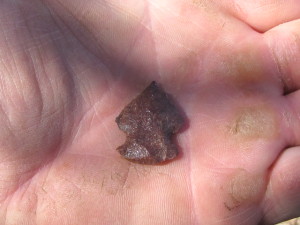The Best Supplements
By Dan Wagman, PhD, CSCS

Using outdated and unscientific training approaches are about as effective as a stone arrowhead vs. GPS – guided missile.
As many of you might already know, I’m off-the-grid. I have chosen a life-style removed as much as humanly possible from the ridiculous fences of society. Instead, I have surrounded myself with the sublimity—and challenges—offered by nature in its purest form, undisturbed by the human hand…or so I thought. I recently found a stone arrowhead and stone tool not far from my outdoor lifting platform.

Why use two arms, eight fingers, and two thumbs where one arm and one finger will suffice? Science will get you there!
My training is on one hand stone-aged as my equipment is outdated and/or improvised. As an example, instead of a pulldown machine I use a tree for chin-ups, pull-ups, and pushdowns via a pulley attached to one of the tree’s thick branches while rocks serve to add resistance. That, however, is actually one of the less important aspects of training for maximal strength and impulse development. What’s infinitely more important is the scientific manipulation of all training variables over time to meet the physiological requirements necessary for maximal training adaptation. Anything short of that and you’re limiting your short- and long-term gains, and that’s something I’m not interested in. So on the other hand my training approach is highly sophisticated and science-oriented. Science, of course, constitutes the backbone to effective human development in all aspects of life. Therefore, during my infrequent trips to a small rural town, I make sure I jump on the internet to download new research. I figure that just because I live primitively, that doesn’t mean my mind has to be primitive, too.
One of the aspects of strength training that has always interested me is that of nutritional supplementation. Strength athletes turn to supplements in an effort to enhance their performance and as a young and ignorant barbell-bender I did the same. Then I became more educated, got exposed to more and more research on supplements and their actual effects on strength gains—if any—and quickly came to realize that the vast majority of supplements hold only imaginary effects. So which supplements can you actually count on to increase your performance? A group of scientists from the University of Western Australia, the Western Australian Institute of Sport, and Edith Cowan University reviewed all scientific evidence on supplements and just published their findings.(2) I took the liberty of reducing their findings to only those supplements that have been proven to enhance a strength athlete’s performance.
CAFFEINE
Caffeine is a stimulant with a lot of research behind its performance-enhancing potential. The mechanism by which caffeine provides its benefits include adenosine receptor antagonism, increased endorphin release, enhanced neuromuscular function, improved vigilance, increased alertness, and feelings of reduced exertion while you train and compete. In looking at studies that investigated high-intensity effort for various durations up to 5 minutes, about 65% of the studies showed benefits with an improvement in mean and peak power output of right around 3% to 8%. This was achieved by consuming 5-6 mg/kg body mass of caffeine one hour prior to exercise. However, there can be a big difference between those of you who never or rarely ingest caffeine and those who have habituated to it. The researchers therefore suggest that, “Athletes who intend to use caffeine as a performance aid should trial their strategies during training or minor competitions, in order to fine-tune a protocol that achieves benefits with minimal side effects.” Since I view coffee primarily as an ergogenic aid, my approach is to only drink decaffeinated coffee and I stay away from other caffeinated products as much as possible. Then, once my training intensity is at 85% 1-rep max or higher I’ll consume real coffee about one hour prior to training.
CREATINE
Creatine just might be the most widely researched supplements. What creatine does is increase phosphocreatine stores, which is a critical component to your muscles’ ability to contract maximally. Numerous review studies have found that creatine can increase single-bout high-intensity exercise by between 1% to 5% and in repeated bouts lasting less than 30-seconds by up to 15%.
In terms of how to most effectively supplement with creatine, a recent meta-analysis (a mathematical analysis of all relevant studies designed to ascertain what the proverbial bottom line is) found that you ought to start off by loading with about 20 g/day, divided into four equal 5-g doses per day, for a duration of five to seven days.(1) After that you can use a single 3 to 5-g dose per day. The downside to spending money on creatine is that other studies have found approximately one-third of subjects to be non-responders. Also to consider is that researchers have found some creatine to be contaminated with substances that could cause a positive in doping control.(3)
BETA-ALANINE
Beta-alanine is a precursor to carnosine which, in effect, is a defense against fatigue. If you were to supplement with beta-alanine at around 65 mg/kg in body mass for a minimum of two to four weeks, you would be able to increase your muscles’ carnosine content by about 65%. In doing so you would increase your muscles’ tolerance for maximal exercise in bouts lasting anywhere from 30 seconds to 10 minutes. In terms of performance enhancement, you could expect something in the neighborhood of 2% to 3%. There is a catch, however. The scientists point out that, “Beta-alanine supplementation may not be as effective in well-trained athletes as their lesser-trained counterparts.” This seems to be due to the fact that the more well-trained you are, the more your muscles are able to buffer the effects of fatigue. So adding this supplement to your diet will have little, if any effect on your already highly capable muscles. This might also be the reason for the high variation in effects seen in individuals.
SODIUM BICARBONATE
This is an interesting supplement with which I have had a perplexing experience. While working on my doctorate one of my dissertation committee members was researching its physiological effects in the lab. He asked me if I wanted to be a subject in his study and I agreed. This meant I had to ingesting multiple doses of sodium bicarbonate stretched out over several hours while also having to give blood for analysis multiple times during every hour. At the conclusion of the experiment I felt horrible and had noticeable gastrointestinal distress as well. I had to bench fairly heavy that day, and considering how horrible I felt, I was fully expecting to get crushed. Yet, most curiously, I was unbelievably explosive; a wholly unexpected result.
The effect of sodium bicarbonate on your physiology is very complex and beyond the scope of this article. Suffice to say, it regulates pH in a way beneficial to muscle contractions. This supplement, too, is associated with high levels of intra-individual variability in performance outcomes, where you could expect something like a 2% gain between 1 hour and 2.5 hours after ingestion.
JUST FOUR!
You might wonder why I didn’t get into more detail, why I didn’t discuss the scientifically proven benefits of more than just four supplements. The reason is, there’s nothing more than these four to talk about, at least as it relates to you being able to maximize your strength gains. And I can hear you already, “But Dan, I read all the time about all sorts of supplements that have research backing their effectiveness.” Yeah, well, manufacturers and many authors take liberties with research and draw conclusions that are not supported by the study or they have generalized beyond what the scientists actually found.
There definitely is a benefit to applying the latest scientific findings to your training and dietary approach. Using a stone-age mindset is of no benefit to you here. If maximizing your strength gains is important to you, only employ that which research has proven to be effective.
References
- Lanhers, C., et al. Creatine supplementation and upper limb strength performance: A systematic review and meta-analysis. Sports Medicine, 2017, 47(1), 163–173.
- Peeling, P., et al. Evidence-based supplements for the enhancement of athletic performance. International Journal of Sport Nutrition and Exercise Metabolism, 2018, 28, 178-187.
- Pipe, A., and C. Ayotte. Nutritional supplements and doping. Clinical Journal of Sports Medicine 2002, 12, 245-249.